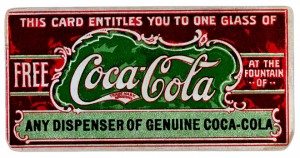Welcome to this week’s Language Blog Roundup, in which we bring you the highlights from our favorite language blogs and the latest in word news and culture.
Earlier this week we celebrated what would have been Douglas Adams’s 61st birthday. Google had an interactive Doodle honoring the author of The Hitchhiker’s Guide to the Galaxy while Neil Gaiman spoke to The Washington Post about Adams’s genius.
National Grammar Day is over but discussion about grammar never ends (in a good way of course). Stan Carey asked which was worse, a double comma or unclosed bracket, and got lots of answers. Ben Yagoda told us seven grammar rules we should really pay attention to, The New York Times rounded up some dangling grammar gaffes, and Open Culture shared David Foster Wallace’s write-up of five common usage mistakes.
Ben Zimmer discussed one young man’s journey to find the origin of scalawag and was also busy anointing the champions of the American Crossword Puzzle Tournament and the Symmys Awards, for the year’s best palindromes.
In more wordplay news, Simon Akam at Slate asserted that words like chillax and bridezilla signify the death of the American pun. However, the love of puns seems to be going strong at the O. Henry Pun-Off World Championships.
At Language Log, Mark Liberman explored nerditude. Johnson took a laughing look at the overzealous Quebec language police and explored metaphors in the digital age. At Lingua Franca, Ben Yagoda told us about the slang expression, a hell of a note; Lucy Ferriss weighed in on hypercorrection; and Geoffrey Pullum gave his opinion about quite. Anne Curzan discussed commas and the language of texting, which is apparently a linguistic miracle.
Stan Carey told us about the dramatic grammatic evolution of LOL and the origin of the word kempt. At Macmillan Dictionary Blog, Michael Rundell gave us the story behind dapper and the difference between who and whom.
Some people freaked out about the wrong definition of literally literally going in the dictionary. John McIntyre suggested that they chill out, and also considered the words omnibibulous and git.
In the week in words, Erin McKean noticed pogonophobia, “fear of facial fuzz”; sede vacante, Latin for “the seat being vacant” (regarding the Pope); tuts, video tutorials on YouTube; and polocrosse, “a mashup of lacrosse and polo.” Fritinancy weekly selections included wudu, “in Islam, the ritual washing of the face, hands, and other body parts in preparation for prayers”; and grist, “grain for grinding; ground grain.”
Word Spy spotted safe shake, “the touching of elbows used as a handshake replacement to avoid spreading germs”; instamentary, “a documentary produced in a very short time, particularly one about a recent news event”; openture, “the tendency to not seek a resolution or ending for an emotionally difficult experience”; and, just in time for Pi Day, pi-ku, “a haiku on the theme of the mathematical constant pi.”
The Dialect Blog dialogued on drawer-draw conflation and the hateful history of wog, “an offensive term in British English which refers to various immigrant groups.” Lynneguist dispelled the myth of –ogue-less Americans. Fully (sic) took a look at Canberra bashing, “the act of criticising the Australian federal government and its bureaucracy,” a term that “will be included in the next edition of the Australian National Dictionary.”
In other dictionary news, Grantland offered some tidbits from The Devil’s Dictionary of Sportswriting, and the first edition of the Dictionary of Canadianisms is now online, from which Akira Orent gleaned 24 particularly interesting ones (we may have mal de raquette from our visit to Boston last week).
At the Visual Thesaurus, Georgia Scurletis stared, glanced, and glared at the words of Twilight. Largehearted Boy alerted us of brackets for “swooniest male” in Young Adult literature (Team Peeta – no, Gale! no, Peeta!), and Quora blogs gave us some Harry Potter etymology.
Mental Floss gave us 11 nicknames and the people who hated them, and The Atlantic explained why hot gym girl is a grosser nickname than hot gym guy. We learned how mountains in the U.S. are named, about the experiences of a lip reader, and why it’s important to invent new words (you don’t need to tell us twice!).
We love that these dead authors have lively social media profiles. We want these tiny books made by 17-year old Charlotte Bronte and these miniature libraries. We’d also like to visit these bookstores in barns.
We were disturbed and amused by these suggested renamings of horse meat, and we’re unreasonably excited now that line breaks are allowed in Twitter.
That’s it for this week!
[Photo: CC BY 2.0 by Jim Linwood]






